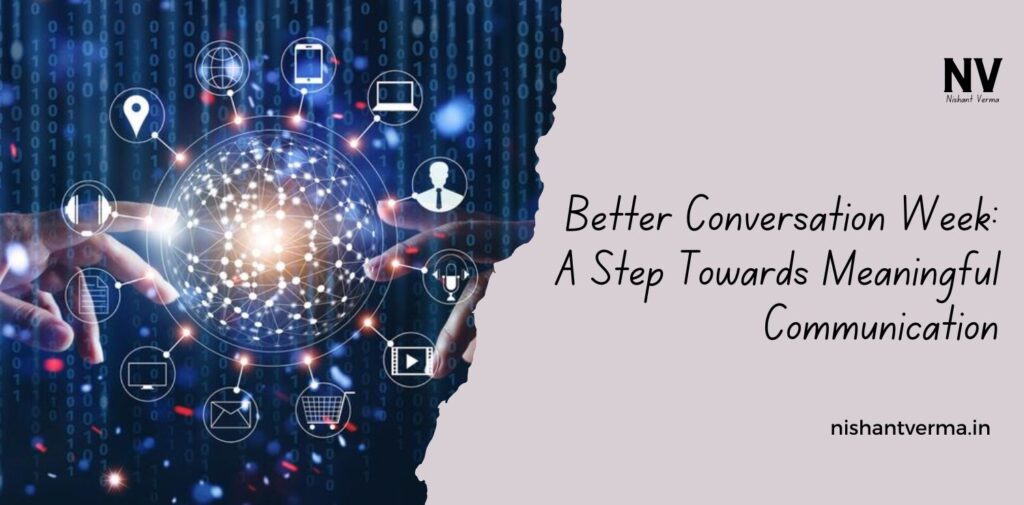Communication is the foundation of our relationships, whether with family, friends, colleagues, or even strangers. It is through conversations that we share our thoughts, express our feelings, and understand the world around us. However, in today’s fast-paced world, meaningful conversations are becoming increasingly rare. People are often caught up in their own busy schedules, using quick messages and emojis, or simply relying on social media to communicate. This has led to a decline in the quality of conversations. To encourage better and more meaningful exchanges, Better Conversation Week is observed, a time to reflect on how we communicate and make efforts to improve our interactions with others.
What is Better Conversation Week?
Better Conversation Week is a week dedicated to promoting healthier, more respectful, and impactful conversations. The goal of this initiative is to raise awareness about the importance of good communication and how it can positively impact personal relationships, professional success, and even society as a whole. While this week is observed internationally, it holds particular relevance in countries like India, where effective communication is key to preserving cultural values, building strong family bonds, and succeeding in both professional and personal life.

Why Better Conversation Week Matters in India
In India, where the culture is rooted in close-knit family ties and community living, conversations often serve as the glue that holds society together. Conversations are not just about exchanging words; they are about understanding each other’s emotions, respecting differences, and fostering empathy. However, in the current digital age, many people are losing touch with the art of face-to-face communication. Social media and texting have become the primary modes of interaction, and often these forms of communication lack depth.
Moreover, many people in India still face barriers to effective communication due to regional language differences, cultural nuances, and social hierarchies. A conversation that would be smooth in one language may become confusing in another, and what is acceptable in one community may be considered disrespectful in another. During Better Conversation Week, people are encouraged to engage in more mindful, inclusive, and empathetic conversations that break these barriers.

Importance of Better Conversations
- Building Stronger Relationships: Conversations form the backbone of relationships. Whether between family members, friends, or colleagues, communication helps people bond, understand each other’s perspectives, and solve problems together. In India, where family plays a central role in one’s life, conversations at home can strengthen relationships, resolve conflicts, and ensure emotional well-being. When people engage in open and honest conversations, it can lead to deeper connections, mutual respect, and trust.
- Improving Professional Growth: In the professional world, effective communication is just as essential as technical skills. Good conversation skills can help individuals express their ideas clearly, collaborate with colleagues, and build professional networks. In India’s rapidly growing corporate sector, clear communication plays a significant role in career advancement. Whether it is presenting an idea to a manager or negotiating with a client, the ability to engage in productive and respectful conversations can make a huge difference.
- Fostering Empathy and Understanding: Conversations are not just about speaking; they are also about listening. In a diverse country like India, where people come from different backgrounds, castes, and cultures, listening with empathy is key to understanding different perspectives. Through active listening, we can acknowledge other people’s feelings and experiences, which can lead to stronger social cohesion. Better Conversation Week encourages individuals to listen more attentively and respond with kindness, promoting tolerance and reducing misunderstandings.
- Enhancing Mental Health: Mental health has become a significant concern in India, with increasing cases of stress, anxiety, and depression. One of the ways to support mental well-being is through meaningful conversations. Talking openly about emotions and struggles with trusted individuals can help reduce feelings of isolation. During Better Conversation Week, people are encouraged to engage in conversations that promote mental well-being, offer support to loved ones, and seek help when needed.
- Promoting Social Change: Conversations have the power to bring about social change. In India, where societal issues such as gender inequality, caste discrimination, and poverty persist, open dialogues can challenge outdated beliefs and foster a more inclusive society. Better Conversation Week is an opportunity to talk about important issues, raise awareness, and work towards positive change. By engaging in respectful and thoughtful conversations, individuals can contribute to building a more just and equal society.

How to Celebrate Better Conversation Week in India
- Practice Active Listening: One of the most important aspects of a good conversation is listening. During Better Conversation Week, make an effort to listen more attentively to the people around you. Whether it is a friend, family member, or colleague, give them your full attention, show empathy, and refrain from interrupting. Active listening helps create a deeper connection and makes the other person feel valued.
- Be Mindful of Your Words: Words have the power to heal or hurt. Choose your words carefully, especially when engaging in sensitive conversations. Avoid using language that could offend or belittle others. In India, where respect for elders and cultural sensitivity is important, it is essential to be mindful of how we communicate, particularly in diverse settings.
- Encourage Open Conversations: Encourage open and honest conversations in your home, workplace, and social circles. Whether it’s discussing a challenging topic or simply sharing experiences, open conversations can foster mutual respect and understanding. Create an environment where everyone feels comfortable expressing themselves without judgment.
- Respect Differences: India is a country of rich diversity, and conversations often involve individuals from different cultures, religions, and backgrounds. During Better Conversation Week, practice tolerance and respect when discussing topics that may be sensitive or controversial. Be open to learning about different perspectives and avoid making assumptions or judgments based on stereotypes.
- Use Technology Wisely: While face-to-face communication is ideal, technology can also be a powerful tool for better conversations. Use messaging apps, video calls, and social media to connect with friends and family, especially if they are far away. However, always remember to use these platforms responsibly, ensuring that your conversations remain respectful and meaningful.
Conclusion
Better Conversation Week is more than just a time to talk; it is a reminder that communication is a vital part of our lives that requires effort and intention. In India, where social bonds and community are so important, it is essential to make our conversations more thoughtful, inclusive, and empathetic. Whether in the family, at work, or in society, engaging in better conversations can help us connect with others, improve our relationships, and contribute to personal and social growth. Let’s take this week as an opportunity to become better listeners, more respectful speakers, and individuals who communicate with care and kindness.




